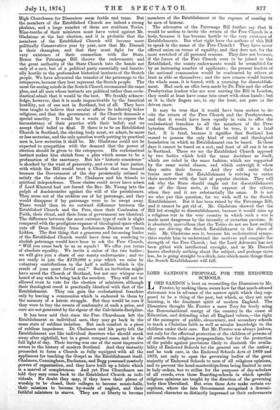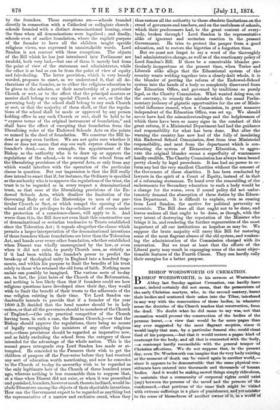LORD SANDON'S PROPOSAL FOR THE ENDOWED SCHOOLS.
LORD SANDON is bent on reconciling the Dissenters to Mr. Forster, by making them aware how far that much-abused statesman was in advance of the narrow spirit which they sup- posed to be a thing of the past, but which, as they are now learning, is the dominant spirit of modern England. The Dissenters thought Mr. Forster a mere Tory for freely using the Denominational energy of the country in the cause of Education, and defending what all England values —the right of the managers of public, elementary, and secondary schools to teach a Christian faith as well as secular knowledge to the children under their care. But Mr. Forster was always jealous, not only for the effectual protection of the children of persons of all creeds from religious propagandism, but for the protection of the public against provisions likely to diminish the availa- bility of Endowed Schools for the general use of the nation ; and he took care, in the Endowed Schools Acts of 1869 and 1878, not only to open the governing bodies of the great majority of Endowed Schools to men of all religious opinions, and to prevent the head-masterships from being limited to men in holy orders, but to utilise for the purposes of day-scholars of all creeds, even those Boarding-schools in which specific religious opinions are taught by the direction of the governing body thus liberalised. But even these Acts make certain ex- ceptions, where the late Government recognised a denomi- national character as distinctly impressed on their endowments by the founders. These exceptions are—schools founded Aireetly in connection with a Cathedral or collegiate church ; schools founded with a distinct denominational leaning, since the time when all denominations were legalised ; and finally, schools even of earlier foundation, where the explicit purpose of the founder to have all the children taught specific religious views, was expressed in unmistakable words. Lord Sandon is not content with these exceptions. The objects of the Bill which he has just introduced into Parliament are twofold, both very bad,—but one of them is merely :bad from the point of view of the statesman and administrator, while the other is as bad as can be from the point of view of equity and fair-dealing The latter provision, which is very loosely worded, proposes to enact, as we understand it, that all de- clarations of the founder, as to either the religious education to be given-to the scholars, or their membership of a particular Church or sect, or to the effect that the principal masters or master shall belong to any special Church or sect, or that the governing body of the school shall belong to any such Church or sect, or that the majority of them shall, or that the regula- lions of the school shall be made or approved by any person holding office in any such Church or sect, shall be held to be " express terms of the original instrument of foundation," and shall have the effect of 'excepting that foundation from the liberalising rules of the 'Endowed Schools Acts on the points so named in the deed of foundation. We construe the Bill in- deed as going even further. We are not quite sure whether it does or does not mean that any one such express clause- in the founder's deed,—as, for example, the appointment of the Bishop as the authority who is to draw up or approve the regulations of the school,—is to exempt the school from all 'the liberalising provisions of the general Acts, or only from any which would interfere with the operation, of the particular clause-in question. But our impression is that the Bill really does intend to enact that if, for instance, the Ordinary is specified as the authority who is to approve the regulations of the trust, the trust is to be regarded as in every respect a denominational trust, so that none of the liberalising provisions of the En- dowed Schools Acts, which disallow the limitation of the Governing Body or of the Masterships to men of one par- ticular -Church or Sect, or which compel the opening of the school and all its privileges to day-scholars of all creeds under the protection of a conscience-clause, will apply to it. And worse than this, the Bill does not even limit this constructive use of denominational or sectarian tendencies to Trusts established 'since the Toleration Act ; it repeals altogether the clause which permits a larger interpretation of the denominational intentions of those founders whose foundations are later than the Toleration Act, and hands over every other foundation, whether established when Dissent was wholly unrecognised by the law, or even when it did not exist,-to purely Church uses, as strictly as if it had been 'within the founder's power to predict the break-up of theological unity in England into a hundred frag- ments, and within his purpose to limit the benefits of his trust solely to those who :retained the old form of faith. Nothing more - unfair -can possibly be imagined. The various sects of to-day are, in fact, the joint heirs of the Church of the Reformation, and nothing is less likely than that if founders could see how religimm questions have developed since their day, they would -. wish-to limit the benefit of their trusts to the adherents of the one -religion existing in their time. Yet Lord Bandon un- ' doubtedly intends 'to provide that if a founder of the year 1600 A.D. decided that the head master should be in holy =orders, or that allthe governors should be members of the Church 'of England,—(the only .practical -competitor of the Church having been, in such a-ease, the Roman Church,)—or that the Bishop should approve -the regulations, 'there being no means of _legally recognising the ministers 'of any other religious sect,—these provisions should be regarded as imperative now, and as fairly excluding the school from .the category of those intended for the advantage of the whole nation. This is the second grave retrograde step Lord Sandon has made or at-.
• tempted. He conceded to the Farmers their wish to get 'the children of paupers off the Poor-rates before they had received any. sort of education worth •mentioning, and now he concedes to the Church of to-day its unworthy wish to be regarded as the only legitimate heir of the Church of three hundred years ago, whereas nothing is less reasonable than to suppose that, at a 'time when Dissent did not exist, or when it was proscribed and punished, founders,however much thereto inclined, would in- clude Dissenters among the objects of their charitable intentions. 'How can the Government expect to be regarded as anything but the representative of a narrow and exclusive creed, when they thus restore all the authority.to those obsolete limitations-onthe creed of governors and teachers, and on the usefulness of schools, which their predecessors had, to the great content of every- body, broken through ? Lord Bandon is the representative alike of ignorant and sectarian reaction• in the present Government. lie tries to -protect the pauper from a .good education, and to restore the bigotries of a forgotten time.
But we must not forget to say a word of the thoroughly bad administrative change, as well as of the reactionatry policy of Lord. Bandon's Rill. If there be a' conceivable blunder par- ticularly inopportune at the present time, when Tories -and Liberals alike allege that the Educational system of 'the country wants welding together into a closely-knit whole, •it, ,is the blunder of putting the reform of the Endowed-School system into the hands of a body so completely dissevered from the Education Office, and governed by -traditions so purely legal, as the Charity Commission. What wanted doing was,•on the _contrary, to :remedy the mistake which the -usual Parlia- mentary jealousy of gigantic opportunities for the use of Minis- terial influence caused, when a Commission, in great measure independent of the Education Office, was set .up. We should never have had the misunderstandings and the helplessness of which there have been so many signs in the conduct of this great reform, if a Ministerial Department had had the guidance and responsibility for what has been done. But - after the warning the country has now -had of the folly of insulating this _Endowed School Commission, tfumt from true Ministerial responsibility, and next from the department which is con- structing -the system of Elementary Education, to aggra- vate the original blunder seems a superfluity of wantonness hardly. credible. The Chaiity Coramission has always been bound pretty closely by legal precedents. It has had-no-power to re- form any but the very smallest Charities without the consent of the Governors of those charities. It has been conducted by lawyers in the spirit of a Court of Equity, instead of in:that ofn reforming statesman. To hand:over the remoulding of: the endowments for Secondary education to such a body would be a change for the worse, even if sound policy did not unfor- tunately demand-the absorption of these duties by the Educa- tion Department. It is difficult to explain, even as coming from Lord Bandon, the -motive for political perversity so eccentric. The Bill does -all that ought not to be done, and leaves undone all that ought to be done, as though, with the very intent of destroying the reputation of the Minister who brings it in, and rendering the further-regeneration of the most important of all our institutions as hopeless as may-be. We suppose the brute majority will carry this Bill for restoring some of the most flagrant, abases of the old system, and weaken- ing the administration of the Commission charged with its renovation. But we trust at least that the efforts of the Liberal party may result in expunging'some of the -most objec- tionable features of the Fourth Clause. They can _hardly a•ally their energies for a better purpose.



































 Previous page
Previous page